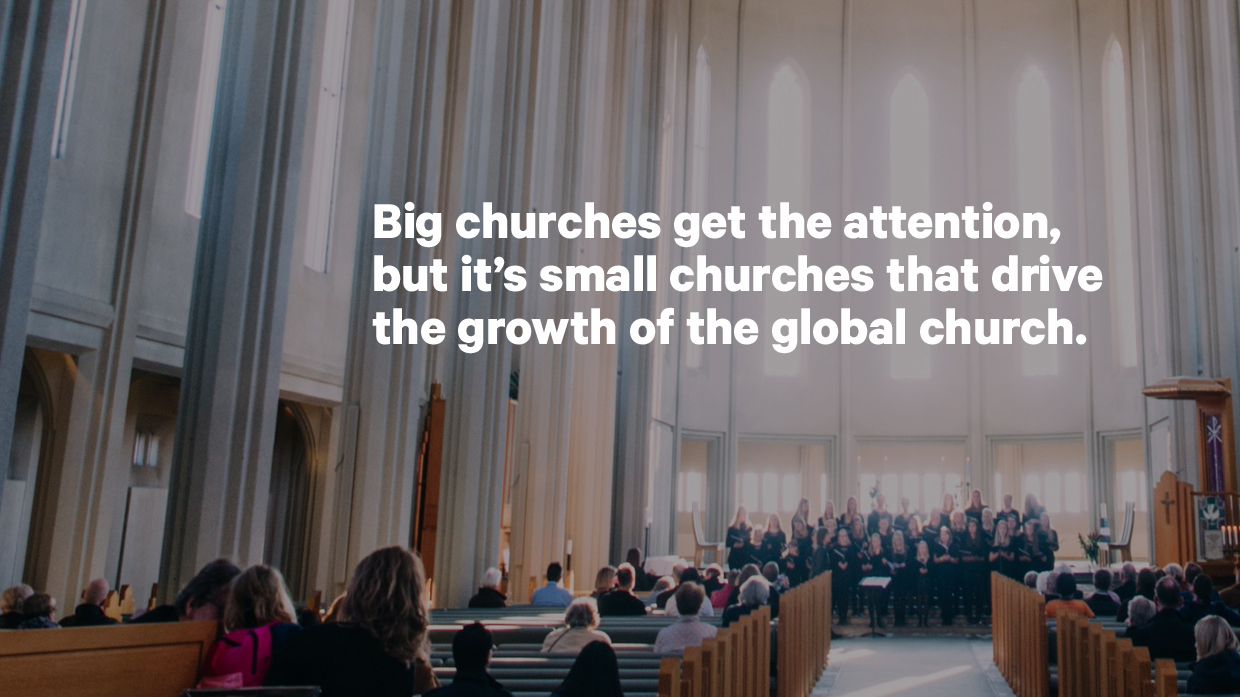I want my church to grow. I want your church to grow.
But more than anything, I want the church to grow.
I want as many people as possible, all over the world, to know Jesus. The good news of the gospel can't be confined within the walls of my church, the distinctives of my denomination, the borders of my country, or the customs of my culture.
And it's precisely because I want the gospel of Jesus to reach the greatest number of people, that I am an avid supporter, promoter, and encourager of healthy small churches.
Big and megachurches are great. And they get almost all the press, both positive and negative. They deserve our prayers and support, not second-guessing, jealousy, and ridicule. But, as valuable as they are, large congregations are not where most people receive the bulk of their spiritual nourishment. Most of that is happening in millions of small congregations all over the world.
According to recent research from Ed Stetzer and Christian Schwarz, "The stats tell us that ten smaller churches of 100 people will accomplish much more than one church of 1000."
Big churches get the attention, but it's small churches that drive the growth of the global church.
If you could choose to do just one thing to support and strengthen the growth of the church around the world, it's hard to imagine a better investment than multiplying, encouraging, and equipping healthy small churches.
In the business world, massive companies like Google, McDonald's, and Coca-Cola get all the attention. But it's small businesses that drive the economy by creating the majority of jobs. The same is true for the church. Big churches get the attention, but its small churches that drive the growth of the global church.
When was the last time you heard that truth stated? Have you ever?
We often talk about how many small congregations there are. But those stats are almost universally seen as a problem to be fixed, instead of an asset we should support and strengthen.
The reason I support healthy small churches isn't because I deny the value of numerical growth. I support small churches because that is where most global church growth is taking place. More people are led to Jesus, discipled, and sent back out into ministry through the ministry of small churches than by any other means.
Church growth does not require small churches to become big churches. Some will. Most won't. What church growth has meant and will continue to mean in most of the world, is more small churches, not necessarily bigger ones. Small churches aren't going away; they're multiplying. It's a mystery as to why we have so little teaching, support and resources dedicated to doing small church ministry well.
If healthy small churches are exploding all over the world, leading some of the greatest revivals in history—which they are—why isn't every church leader in the world celebrating, supporting, and promoting more healthy small churches?
Is it because of a western (mostly American) bias for bigness? I think so.
Bigger churches may be the way the American church is growing. (Even that's debatable, though.) But they're not the primary cause for the growth of the church globally. That's happening almost exclusively due to the multiplication—in some places, the explosion—of smaller congregations.
If you're a small church pastor, take heart. You're not a failure. Quite the opposite.
You and your church are an indispensable asset in the eternally valuable task of reaching the world for Jesus.
Small churches may be Christianity's most overlooked, underutilized asset. If they've been reaching the world while we've been looking the other way, just imagine what they could do with our support.
Karl Vaters is pastor of Cornerstone Christian Fellowship in Fountain Valley, California.
Copyright © 2015 by the author or Christianity Today/Leadership Journal. Click here for reprint information on Leadership Journal.










